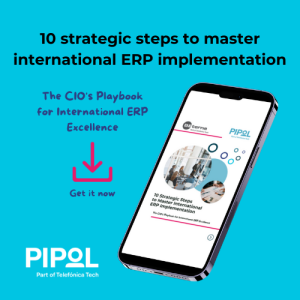Your business is growing, fast. How do you know when it’s time to invest in ERP Software?

It’s all about growth. Virtually every company wants to increase its business. And when at last it happens, it probably feels like you’ve reached your goal and now you can sit back and reap the benefits. But it’s essential that you know how to skillfully manage the growth so it’s sustainable. As your business expands, how can you be sure that you’re managing your administrative, sales, and customer services as optimally as possible?
You’ve implemented smart internal processes to help manage your growth, by leveraging accounting software and other spreadsheets. And this works great when the company is small. But as your company expands, using multiple applications can cause organization-wide problems that you hadn’t quite envisioned. So, what’s the solution? Enterprise Resource Planning (ERP) software.
ERP efficiently centralizes all aspects of business operations within one system. It automates your business areas, and improves the information flow across the company. ERP empowers staff because they can access, share, and update information with colleagues throughout your organization, in real time. So, how do you know when you should switch to ERP?
Six unmistakable signs that it’s time to invest in ERP Software
1. Your current software systems are speaking different languages
Oh, those dreaded silos. For a business to operate efficiently as a single entity, data must be easily shared around the whole organization. Unfortunately, your current software systems don’t talk to each other. That’s because you’ve been using several different systems to manage distinct areas of operations. And this probably means there’s a lack of transparency between different ends of the business. If this sounds like your organization, you’re not alone; it’s common in growing companies. By investing in ERP software and centralizing information, ‘data silos’ are eliminated. And cross-departmental communication is enhanced at every level. Read more about how Pipol can help you choose and implement the best ERP solution here.
2. Your customers aren’t as happy as they should be
We all know that it’s cheaper and easier to sell to existing customers than acquiring new ones. Managing stock is tricky business, but it’s critical for customer satisfaction. With many growing companies, each department uses different software: sales uses their preferred CRM, purchasing uses their own system, and warehouse ops uses a third system for inventory management. When these systems aren’t integrated, it can be very challenging to handle stock control effectively. So with a growing company, the risk of disappointing customers (through unfulfilled orders) is even greater. Here again, ERP can help—by streamlining all these functionalities. When customers receive orders on time, they’re happy. And happy customers mean repeat business, as well as valuable word-of-mouth advertising.
3. Your financial managers are pulling their hair out
Does your financial management team have complete visibility of all financial transactions, across the organization? If not, this can hinder effective management. Business growth goes hand-in-hand with a sizeable increase in the number of individual financial transactions. Effective accounting and bookkeeping is essential, but it’s often managed through the finance department’s stand-alone system.
With a fully integrated ERP system, your finance team will automatically get regular financial updates from company-wide departments. No need for integrating with other departments’ systems. This reduces overall complexities and time-consuming data entry tasks (because accounting ledgers are updated automatically). And, it means speedy cross-organizational reporting.
4. Your business intelligence isn’t as smart as it could be
Has it become challenging to collect and analyze information on your business? If so, then how can you feel confident that you’re making truly informed decisions? ERP software makes it easy to gather the data you need, because it centralizes information in one place. An ERP system can also include reporting functionality, making it simpler for your teams to analyze information. As such, you’ll be able to make well-informed decisions accordingly. Read more about the Business Intelligence here.
5. Managing your IT systems has become unwieldly, and pricey
When you use multiple software systems, it’s costly and cumbersome. Your IT infrastructure becomes stretched, and you spend money on annual software licenses and support contracts. Then there’s the outlay for hardware upgrades and additional IT staff. By streamlining systems, ERP software can reduce overall IT costs. More efficiency, and cost-effective.
6. The world’s going mobile… maybe you should too
Immediate information, on-the-go. Travelling sales, management, and other mobile staffers benefit greatly from having access to real-time data when they’re working remotely. And ERP software can provide functionality designed specifically for staff who travel. Accessible on all devices (smartphones, tablets, and laptops). Without up-to-date information, critical decision-making can be hindered. Sales may suffer, and management decisions may be uninformed. With ERP, your teams can access the software they need to manage and drive your business from anywhere.
So, is it time for your organization to take the leap into the world of ERP solutions? We invite you to reach out to us, to find out more about ERP and how it can help your company continue to grow—well into the future.
Click here to contact us and learn more about how we can help you manage your growth.





